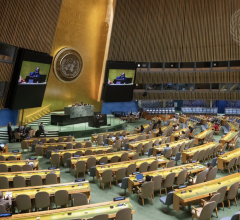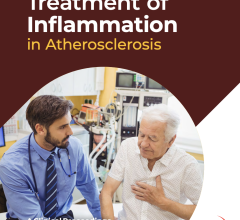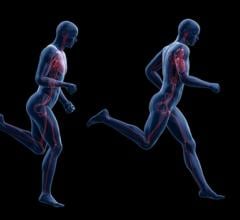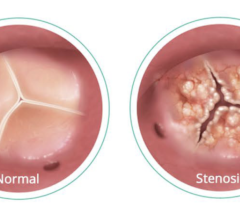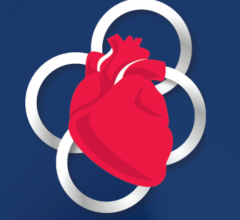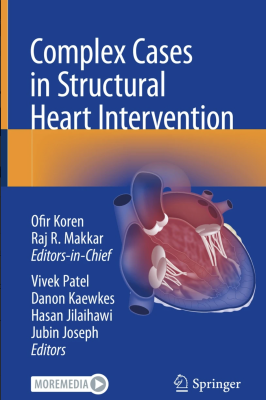
A new book for interventional cardiologists includes a collection of detailed case studies, clinical data and imagery, has been written by a team of investigators from the Smidt Heart Institute at Cedars-Sinai (Los Angeles, CA), with other editors and contributors. Image courtesy: Springer Nature.
May 4, 2023 — A new book on a broad collection of cases, led by a team of investigators from the Smidt Heart Institute at Cedars-Sinai (Los Angeles, CA), with other editors and contributors, is now available for interventional cardiologists to consult, according to an April 27 online news summary published by Cedars-Sinai. In the online article, Katie Brind’Amour, PhD, MS, CHES, referred to the publication as a “comprehensive collection of intraoperative management approaches,” writing further that it “provides a roadmap to guide physicians through potential management strategies for the challenging ‘What if … ?’ and ‘What now?’ circumstances they may face.”
Complex Cases in Structural Heart Intervention offers dozens of highly detailed case studies, richly documented with clinical data and imagery, as well as key takeaways and reference lists, according to the overview. It further offered that the cases include management and outcomes for procedures involving burst balloons, extensive stenosis, functional deterioration, rare structural abnormalities, obstructions and access difficulties, embolization, and much more.
Among the editors were Smidt Heart Institute clinicians: Ofir Koren, MD, senior interventional cardiologist; Raj Makkar, MD, vice president of Cardiovascular Innovation and Intervention and the Stephen R. Corday, MD, Chair in Interventional Cardiology; Vivek Patel, MS, biomedical engineer; and Hasan Jilaihawi, MD, senior interventional cardiologist. They are joined by Danon Kaewkes, MD, Khon Kaen University, Khon Kaen, Thailand; and Jubin Joseph, MD, PhD, University of Southern California.
Koren, part of the interventional team who led the editorial effort, offered this description to the Diagnostic and Interventional Cardiology/DAIC (www.dicardiology.com) editorial team upon the book’s publication: “It discusses, illustrates, and guides interventional cardiologists, general cardiologists, and even GPs, on how to deal with the most complicated cases in the field of structural heart intervention, how to plan the procedure before, what to look for, how to avoid technical obstacles and what to do to when complication occur. We share our knowledge, techniques, tips, and tricks as one of the most experienced teams in the world. The book could save many complications and dare interventional cardiologists to include more patients who were previously rejected from the procedure.”
"We believe this collection of case studies will help guide interventional cardiologists through some of the challenging situations they may encounter during their career," said Koren, who has published widely on structural heart interventions. According to the Cedars-Sinai online news summary of the book, he added, "By proactively exploring management solutions for these difficult scenarios, we all can be more prepared to effectively address unexpected circumstances during our day-to-day care of patients."
An online description of the book by its global publisher, Springer Nature, offered this summary: “Structural heart disease encompasses a wide range of abnormalities involving noncoronary structures like the heart's valves, walls, and chambers. The last decade emphasized the burden of the disease and revolutionized the treatment strategies. The number of percutaneous structural heart interventions constantly increases worldwide. While some parts of the world acquire experience with various intervention treatments, techniques, and devices, others are paving their first steps.”
Complex Cases in Structural Heart Interventions, according to the publisher’s profile of the work, provides “a descriptive and highly illustrative insight, with 300 colored images, into unique clinical situations managed by one of the world's most experienced and innovative teams. Each case study contains a clinical presentation, imaging analysis, procedural dilemmas, and resulting outcome. A detailed explanation of the technique used, key points and tips were highlighted, and a literature review covered broad knowledge on each topic. The authors shared their knowledge and distinctive solutions from over a decade of experience to ensure an educational adventure for the medical community and a roadmap for interventional heart teams.”
Publisher-provided summaries of the editorial team involved in the publication are included here.
Koren Ofir, MD, is an Interventional Cardiologist, and Fellow in Structural Interventional Cardiology at Smidt Heart Institute at Cedars-Sinai Medical Center. He focuses on coronary and structural interventions. He holds an academic at the Bruce and Ruth Rappaport Faculty of Medicine at the Technion-institute of Technology in Israel. He taught for many years and was repeatedly awarded as an outstanding lecturer by faculty students and colleagues. He conducted multiple national trials as a prime investigator and served as a SI for major international studies. Koren published numerous manuscripts and book chapters in leading peer-review journals, presented them at major international conferences, and was awarded for his research achievements.
Raj Makkar, MD, is Director, Interventional Cardiology Division, Director of the Interventional Cardiology Research Program, Vice President, Cardiovascular Innovation and Intervention, and Executive Director, Cardiac Interventional Services at Smidt Heart Institute, Cedars-Sinai Medical Center. Makkar is a world-renowned leading expert in interventional cardiology and is one of the most widely cited researchers on the management of valvular heart disease. He has performed the greatest number of transcatheter valve implantation (TAVI) procedures in the world and has led the field in advancing the procedure to ensure the best outcomes for patients. In 2020, he performed the most transcatheter mitral valve repair procedures with the MitraClip system in the United States and is the national principal investigator for mitral valve replacement research studies. He has authored over 500 manuscripts, abstracts and book chapters in peer-reviewed literature including practice-changing contributions in the New England Journal of Medicine and the Lancet.
Vivek Patel, MS, is also with the Smidt Heart Institute, Cedars-Sinai Medical Center, and is a Biomedical Engineer who has a keen interest in Transcatheter structural cardiovascular devices and Imaging. With a strong level of knowledge, a diverse skill set, and solid research capabilities in structural heart disease intervention, Patel has contributed and reviewed multiple manuscripts for the leading peer-review journals. He has provided a key role in the national CT Imaging Core lab in multiple clinical Transcatheter devices studies.
Hasan Jilaihawi, MD, is a Senior Interventional Cardiologist at Cedars-Sinai. Prior, he was Associate Professor of Medicine and Cardiothoracic Surgery and the Director of the Imaging Corelab at NYU Langone Health. He is involved in all aspects of cardiology, with a special interest in innovative methods of imaging the heart, complex percutaneous coronary intervention and device and patient selection within the novel field of transcatheter valve therapies. His international reputation in the field has earned him the prestigious responsibility of running the CT corelab for the pivotal US trial of the Portico device, the world’s first fully repositionable and retrievable TAVR, as well as the CT corelab for China’s first TAVR trial. He has authored more than 100 peer-reviewed manuscripts in journals including the New England Journal of Medicine, the Journal of the American College of Cardiology and the European Heart Journal.
Danon Kaewkes, MD, is Senior Interventional cardiologist Department of Medicine, Faculty of Medicine, Khon Kaen University, Khon Kaen, Thailand. His expertise in TAVR and edge-to-edge mitral repair procedure and published multiple manuscripts in leading PR journals. Kaewkes was a fellow in interventional cardiology, Cedars-Sinai, LA, California during the years 2019-2021.
Jubin Joseph, MD, PhD, is an interventional cardiologist with expertise in structural intervention. He completed undergraduate medical education at both Cambridge and Oxford University before undertaking post-graduate clinical training in Oxford and London. He has broad experience across the whole range of structural interventions and since 2020 had been working at Cedars Sinai Medical Center, Los Angeles with a particular focus on mitral and tricuspid intervention. Joseph is currently the Associate Director of Structural Interventions in the Cardiac & Vascular Institute and Clinical Assistant Professor of Medicine at the Keck School of Medicine of the University of Southern California.
For more information: www.springer.com

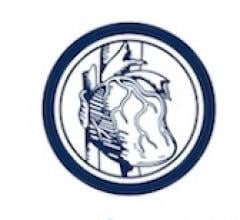
 April 10, 2025
April 10, 2025 


